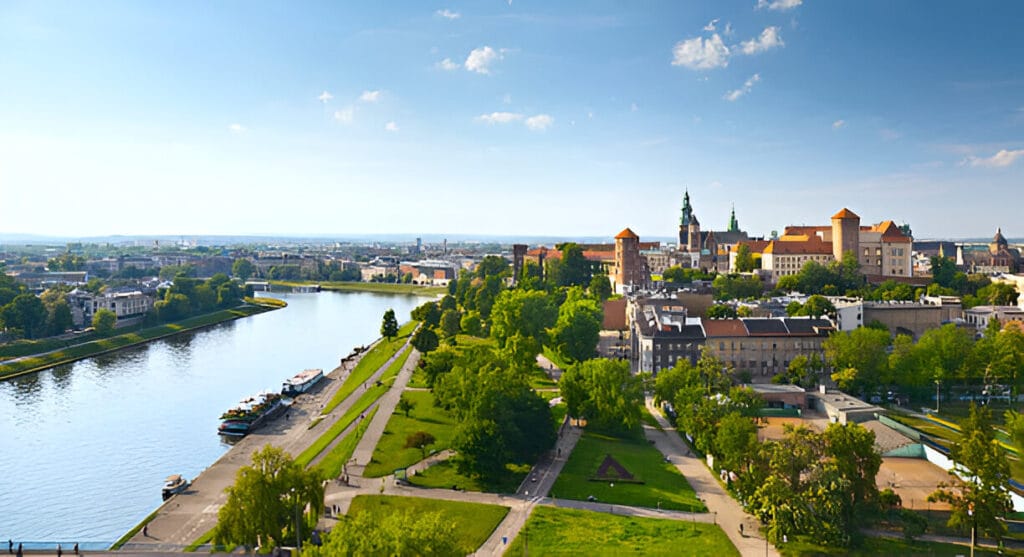Poland has rapidly emerged as one of the top study destinations for international students. Offering a combination of affordable tuition fees, globally recognized degrees, and an enriching cultural experience, studying in Poland is becoming more popular with students seeking quality education abroad. Whether you’re interested in fields like engineering, medicine, or business, Poland offers a range of programs taught in English at prestigious institutions. In this blog post, we will cover everything you need to know about studying in Poland, from tuition costs to post-graduation opportunities.

Why Choose Poland for Your Studies?
Poland’s academic institutions offer a wide array of courses with a focus on practical skills and employability. The country has a rich educational history, with universities dating back to the 14th century. However, its modern facilities and teaching methods are designed to meet the needs of today’s students.
1. Affordable Tuition Fees
One of the key reasons to study in Poland is the affordable tuition fees. While countries like the USA and UK charge exorbitant fees, Poland provides high-quality education at a fraction of the cost. Tuition fees for international students range from €2,000 to €6,000 per year, depending on the program and university.
2. Quality Education and Globally Recognized Degrees
Polish universities adhere to the Bologna Process, meaning degrees awarded in Poland are recognized across Europe and other parts of the world. Whether you pursue a Bachelor’s, Master’s, or PhD, your qualifications will be valid and respected internationally. Poland is known for its strong programs in engineering, medicine, computer science, and business.
3. Cultural Diversity and Rich History
Studying in Poland is also an opportunity to immerse yourself in a country with a unique blend of medieval history and modern lifestyle. Poland’s cities, like Warsaw, Kraków, and Gdańsk, offer historical monuments alongside cutting-edge technology and modern amenities. Living in Poland, you’ll experience everything from gothic castles to vibrant nightlife.
4. Opportunities for Post-Graduation Employment
After graduation, international students can apply for a temporary residence permit to stay in Poland while they look for job opportunities. Poland’s economy is growing steadily, particularly in fields such as information technology (IT), engineering, and business. Many multinational companies have established offices in Poland, providing ample employment opportunities for graduates.
Top Universities in Poland
Poland is home to several top-ranked universities that offer a variety of programs in English. Some of the top institutions include:
- University of Warsaw: Known for its diverse programs and world-class research.
- Jagiellonian University: One of the oldest universities in Europe, offering a range of fields from the humanities to the sciences.
- Warsaw University of Technology: Specializes in technical and engineering courses.
- AGH University of Science and Technology: A leader in science, engineering, and technology.
- Medical University of Gdańsk: Renowned for its medical programs, attracting students from all over the world.
How to Apply for a Study Visa
You’ll need a student visa to study in Poland if you’re a non-EU citizen. Here’s a simple guide to the visa process:
- Get an Acceptance Letter: First, apply and get admitted to a Polish university.
- Submit a Visa Application: Gather documents such as your passport, admission letter, proof of finances, health insurance, and visa application form.
- Attend an Interview: Visit your nearest Polish embassy or consulate for an interview.
- Receive Your Visa: You can travel to Poland and begin your studies after approval.
Popular Programs to Study in Poland
Poland is known for offering top-quality programs in several fields of study, particularly:
- Engineering and Technology: Poland’s universities are known for their strong engineering departments.
- Medicine: Affordable medical degrees with global recognition attract students from across the world.
- Business and Economics: English-taught programs in business and management are widely available.
- Computer Science: Poland is a tech hub in Europe, making it a great place to study computer science and IT.
Language of Instruction
Although Polish is the official language, many universities offer programs taught in English. International students can choose from hundreds of English-taught degrees, particularly in popular fields such as medicine, engineering, business, and computer science.
For students planning to stay in Poland long-term, learning basic Polish can be helpful for daily interactions and can enrich your cultural experience.
Scholarships and Financial Aid
International students have access to various scholarships and financial aid programs, including:
- Erasmus+: For European students studying abroad in Poland.
- Poland My First Choice: A scholarship program aimed at attracting the best students from non-EU countries.
- Government of Poland Scholarships: Offered to students from select countries
Conclusion
Studying in Poland offers a unique blend of affordable education, high-quality programs, and an immersive cultural experience. From top universities to the chance to explore Europe, Poland provides students with a well-rounded and rewarding academic journey. With globally recognized degrees, low tuition fees, and a welcoming environment, Poland is a top destination for international students looking to excel in their careers.
FAQs
1. Is Poland an expensive country to study in?
No, Poland is one of the most affordable study destinations in Europe. Tuition fees range from €2,000 to €6,000, and the cost of living is relatively low.
2. Do I need to know Polish to study in Poland?
No, many universities offer programs in English. However, learning Polish can be beneficial for daily life and cultural immersion.
3. What are the best universities in Poland?
Top universities include the University of Warsaw, Jagiellonian University, Warsaw University of Technology, and AGH University of Science and Technology.
4. How much is the cost of living in Poland for students?
Students typically spend between €350 to €600 per month on accommodation, food, and other living expenses.
5. Can international students work in Poland after graduation?
Yes, international students can apply for a temporary residence permit to look for work after graduation.
